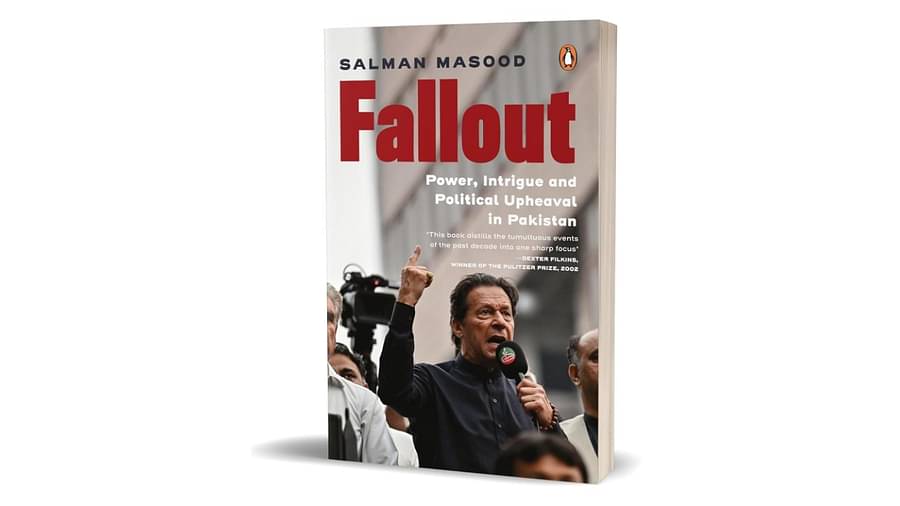Salman Masood’s Fallout: Power, Intrigue and Political Upheaval in Pakistan is a captivating exploration of Pakistan’s complex political landscape, focusing on the civil-military tensions that have shaped the nation’s recent history. Published by Penguin Random House in 2024, the book is structured as a compilation of columns, but its seamless narrative elevates it beyond a mere collection. Masood’s keen journalistic eye gives readers an unflinching glimpse into the machinations of power, especially through the lens of Imran Khan’s political rise and fall.
At first, one might dismiss Fallout as a simple compilation of Masood’s regular dispatches for The New York Times or The Nation, where he serves as editor. However, the 256-page book is far from a disconnected series of columns. Instead, Masood stitches together his reports and insights to form a cohesive story that navigates Pakistan’s political turmoil, centering on “The Project” – the Pakistan Army’s strategy to propel Imran Khan to power, which begins to gather momentum in 2014.
What makes Fallout a standout is its accessibility. Divided into 59 short chapters, the book gives readers a sweeping yet manageable view of Pakistan’s politics. Masood avoids the tediousness of dense political analysis and instead offers a gripping, episodic recount of the events that have unfolded over the past decade. His prose is sharp, wry, and incisive, capturing the fragile dance between civilian leaders and the omnipresent military establishment.
The story begins with Khan, who for years lingered on the political margins despite his national hero status as Pakistan’s World Cup-winning cricket captain and his philanthropic endeavours, including the establishment of Pakistan’s first cancer hospital. The book shows how, after years of struggling to gain traction, Khan was positioned by the military as a fresh alternative to the entrenched dynastic politics represented by Nawaz Sharif and Asif Zardari.
At its core, Fallout highlights the perennial struggle for power in Pakistan: the tug-of-war between civilian politicians and the military, which, despite professing its desire to relinquish control, cannot resist pulling the strings behind the scenes. The army’s deep entanglement in Pakistan’s civilian and economic spheres becomes evident through the book’s coverage of the 2014 anti-government protests, Khan’s rise to premiership, and the inevitable fallout that follows.
A key focus of the book is General Qamar Javed Bajwa, the army chief from 2016 to 2022, and his complex relationship with Khan. Masood expertly captures Bajwa’s balancing act – talking of a return to civilian supremacy while maintaining the military’s tight grip on the country’s power structures. This contradiction comes to a head when Khan, unable to solve Pakistan’s worsening economic crisis, resorts to populist rhetoric, mixing religious nationalism with anti-Western sentiments, particularly targeting the United States as a supposed enemy.
Fallout also explores the irony of Khan’s rise. Initially hailed as a clean and incorruptible leader by his military backers, Khan’s government quickly struggled to tackle Pakistan’s deep-seated economic woes. As the economy faltered, Khan’s governance failures mounted. Masood’s portrayal of this decline is both riveting and tragic, as the reader witnesses a once-promising figure fall into the very traps he vowed to dismantle.
The book further underscores the military’s reluctance to fully relinquish control. While General Bajwa often spoke of giving power back to civilians, the army’s role in Pakistan’s civilian economy—ranging from agriculture to real estate—remained intact, with many retired generals continuing to enjoy lucrative posts. The army, as Masood illustrates, is as embedded in the civilian sphere as ever, with no clear path toward a genuine transfer of authority.
One of the most compelling sections of Fallout is Masood’s recount of the dramatic final days of Khan’s premiership. In April 2022, following his refusal to cancel a visit to Russia amidst the Ukraine invasion, Khan faced a no-confidence vote in the National Assembly, which he ultimately lost. His removal from power was marked by a series of violent protests by his supporters, culminating in the burning of the Lahore Corps commander’s house—a significant and symbolic moment in Pakistan’s military-civil relations.
As Masood brings his narrative to a close, Khan’s future remains uncertain. The army’s disenchantment with him is clear, but his popularity among Pakistan’s masses, particularly in small towns, remains resilient. Despite being jailed on questionable charges, Khan’s political movement is far from over, as his supporters continue to challenge the country’s political establishment.
Fallout is a meticulously crafted account of Pakistan’s recent history, offering an unparalleled look into the civil-military dynamic that has long governed the country. Masood’s writing is both accessible and insightful, making it a must-read for anyone seeking to understand Pakistan’s current political landscape. His ability to distil complex political events into digestible and engaging prose is a testament to his journalistic prowess.
Ultimately, Fallout is not just a book about Imran Khan or the Pakistan Army—it is a story about the ongoing struggle for power in Pakistan, where democracy remains perpetually fragile and the military’s shadow looms large over every civilian attempt to govern. Masood has crafted a political thriller that reads as both a historical account and a warning of what may come next in Pakistan’s tumultuous political saga.
